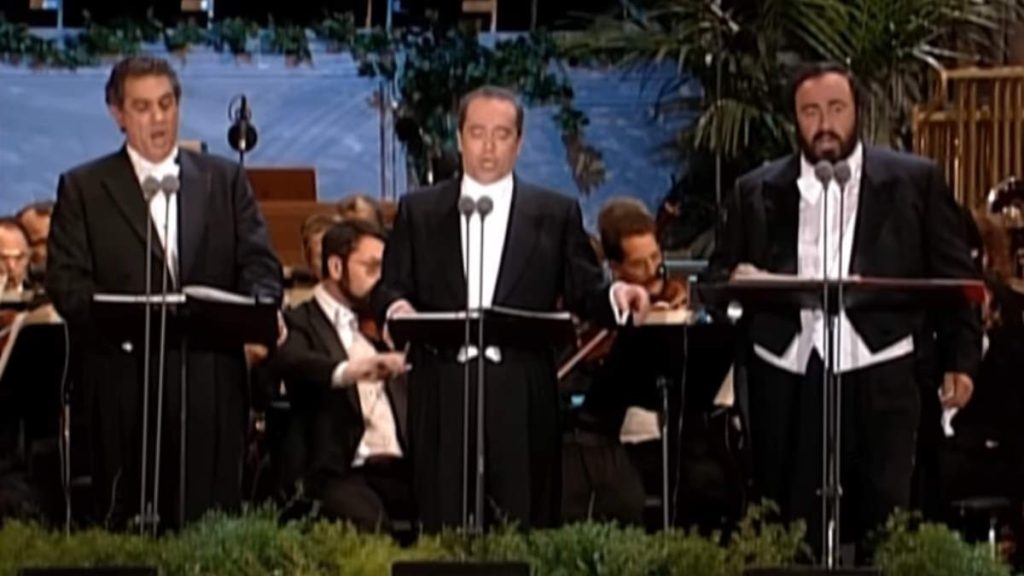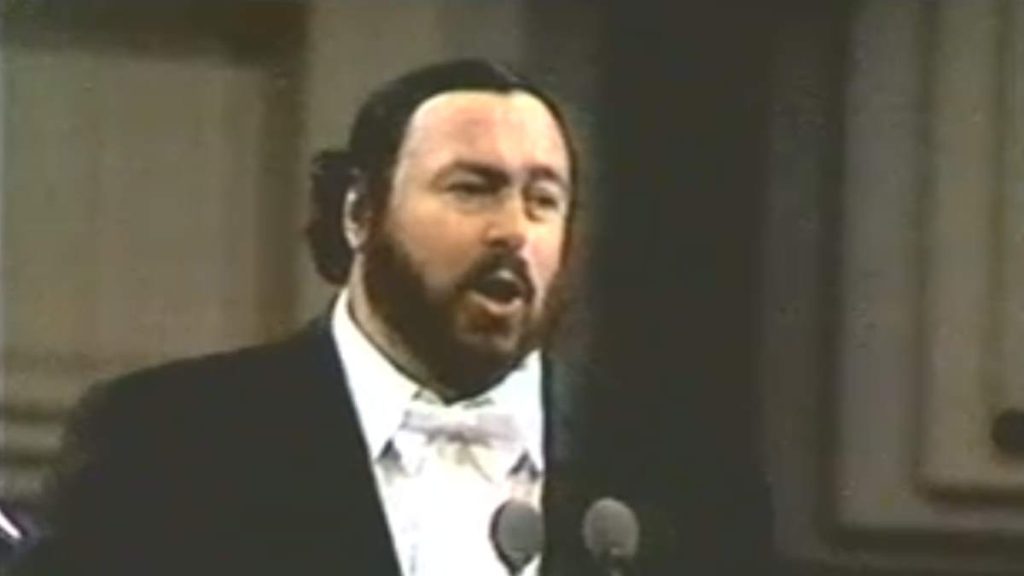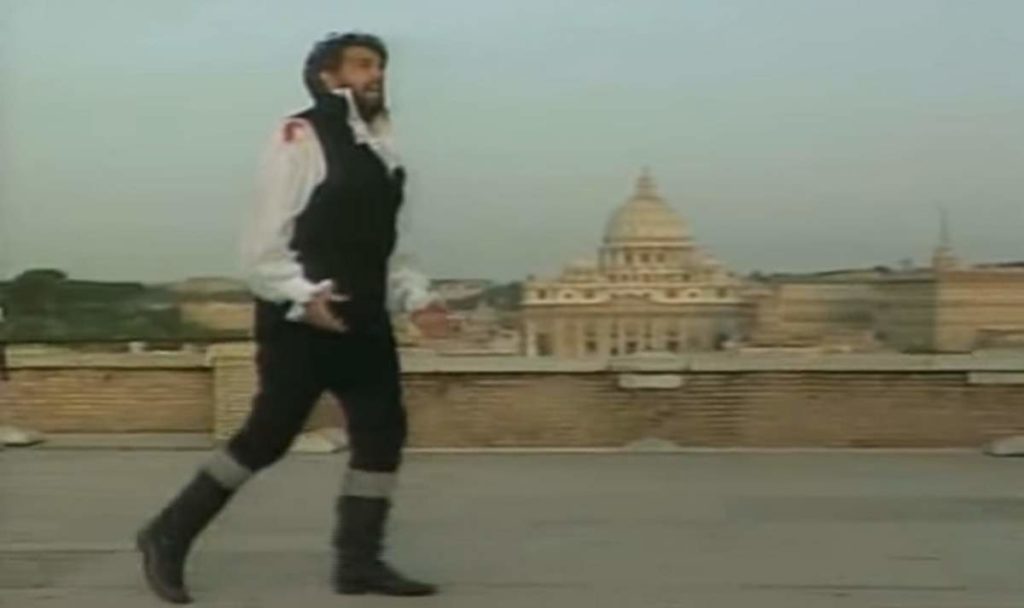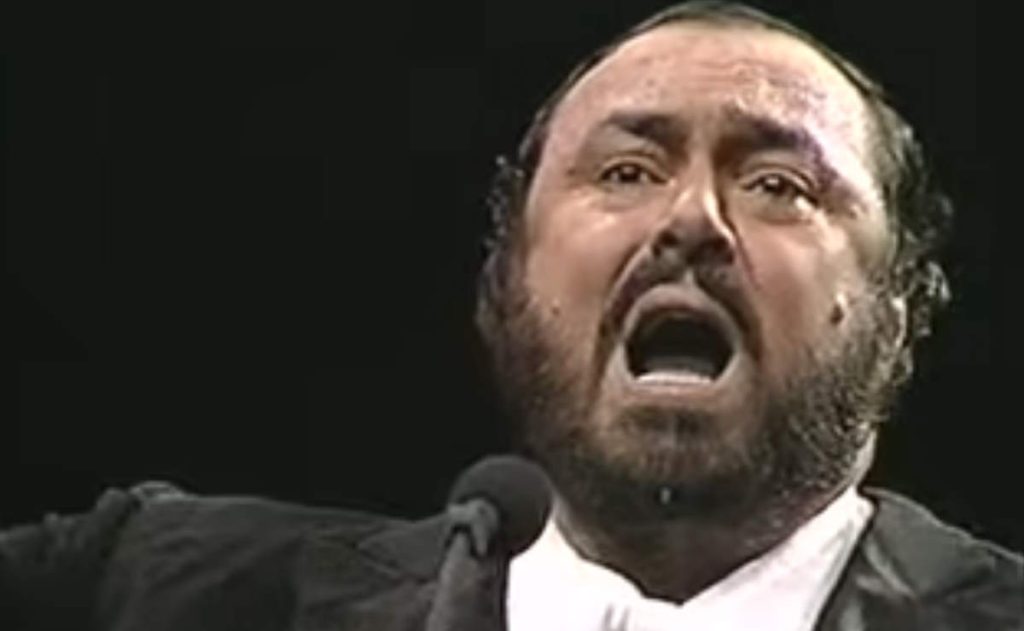The most celebrated operatic singing trio of the late 1990s and early 2000s, The Three Tenors‘ 1996 London concert. The concert took place at Wembley Stadium, and the Royal Philharmonic Orchestra accompanied the famous tenors Luciano Pavarotti, Plácido Domingo, and José Carreras. Conductor: James Levine.
The Three Tenors Wembley Stadium, London, 1996 concert song list
1. Leonard Bernstein: Candide Overture
“Candide Overture” is a vibrant and effervescent orchestral work composed by Leonard Bernstein. It serves as the introduction to his operetta “Candide,” which premiered in 1956. The operetta itself is based on Voltaire’s satirical novella of the same name, which delves into the adventures and misadventures of its titular character as he journeys through a series of calamities, all the while maintaining his optimistic philosophy that “all is for the best in the best of all possible worlds.”
The overture encapsulates the energy and spirit of the entire operetta within a short span, making it one of Bernstein’s most beloved and frequently performed pieces. Within its brisk duration, Bernstein weaves together various themes from the operetta, showcasing his brilliant orchestration skills and his ability to craft melodies that are both catchy and deeply emotional.
The music is characterized by its swift changes in tempo, mood, and dynamics. It features rhythmic drive, contrasting playful sections with more lyrical moments. Its energy is almost relentless, pushing forward with an infectious zest for life, much like the character of Candide himself.
While the operetta had mixed success initially, the overture quickly gained popularity on its own, becoming a staple in concert halls and often being played as a standalone orchestral piece. Its versatility has led it to be performed by a range of ensembles, from full orchestras to smaller chamber groups. The “Candide Overture” remains a testament to Bernstein’s unique voice in American music, bridging the gap between classical and Broadway styles.
2. Francesco Cilea: È la solita storia del pastore [José Carreras]
“È la solita storia del pastore”, also known as “Lamento di Federico” (lament of Federico) is a poignant aria from Francesco Cilea’s opera “L’arlesiana.” Composed in 1897, “L’arlesiana” is based on a play by Alphonse Daudet, which delves into a tragic tale of love, jealousy, and despair.
The aria “È la solita storia del pastore” is sung by the character Federico, who is deeply in love with a woman from Arles, known simply as l’Arlesiana (the woman from Arles). In this aria, Federico reflects on a shepherd’s tale he’s read, comparing the shepherd’s longing and heartbreak to his own unrequited love for l’Arlesiana. The title translates to “It’s the usual story of the shepherd.”
Musically, Cilea captures the deep melancholy and yearning of Federico. The aria starts with a soft and introspective mood, gradually building in intensity as Federico’s emotions overflow. By using sweeping melodic lines and rich orchestration, Cilea conveys the tumultuous feelings of love and heartbreak that the character is experiencing.
Over time, “È la solita storia del pastore” has become one of the most recognized and performed tenor arias in the operatic repertoire. It stands out not just for its beautiful melody but also for the depth of emotion it requires from the performer, making it a favorite among tenors looking to showcase both their vocal prowess and emotional range.
È la solita storia del pastore lyrics (libretto)
Italian dramatic poet and librettist Leopoldo Marenco (1831-1899) wrote the Italian libretto.
Italian
È la solita storia del pastore…
Il povero ragazzo voleva raccontarla
E s’addormì.
C’è nel sonno l’oblio.
Come l’invidio!
Anch’io vorrei dormir così,
nel sonno almen l’oblio trovar!
La pace sol cercando io vo’.
Vorrei poter tutto scordar!
Ma ogni sforzo è vano.
Davanti ho sempre di lei
il dolce sembiante.
La pace tolta è solo a me.
Perché degg’io tanto penar?
Lei! Sempre lei mi parla al cor!
Fatale vision, mi lascia!
Mi fai tanto male! Ahimè!
English translation
It’s the old tale of the shepherd…
The poor boy wanted to retell it
And he fell asleep.
There is oblivion in sleep.
How I envy him!
I too would like to sleep like that
To find oblivion at least in slumber!
I am searching only for peace.
I would like to be able to forget everything!
Yet every effort is in vain.
Before me I always have
her sweet face.
Peace is ever taken from me.
Why must I suffer so very much?
She, as always speaks to my heart.
Fatal vision, leave me!
You hurt me so deeply! Alas!
3. Pietro Mascagni: Mamma! Quel vino è generoso [Luciano Pavarotti]
“Mamma! Quel vino è generoso” is an Italian phrase that translates to “Mom! That wine is [too] strong” in English. It’s a line from the famous Italian opera “Cavalleria Rusticana” written by Pietro Mascagni. The opera is known for its emotional intensity and melodramatic storytelling.
Mamma, quel vino è generoso lyrics (libretto)
Italian
Turiddu
Mamma,
Quel vino è generoso, e certo
Oggi troppi bicchieri
Ne ho tracannati…
Vado fuori all’aperto.
Ma prima voglio
Che mi benedite
Come quel giorno
Che partii soldato.
E poi… mamma… sentite…
S’io… non tornassi…
Voi dovrete fare
Da madre a Santa,
Ch’io le avea giurato
Di condurla all’altare.
Lucia
Perché parli così, figliuol mio?
Turiddu
Oh! nulla!
È il vino che mi ha suggerito!
Per me pregate Iddio!
Un bacio, mamma…
Un altro bacio… addio!
[L’abbraccia ed esce precipitosamente.]
English translation
Turiddu
Mother,
That wine is [too] strong.
And in truth I’ve drunk
Too much of it today…
I must go out into the fields.
But give me first
Your blessing.
As you did that day
When I went off as a soldier…
And then… mother… listen…
If I should not return
You must be a mother
To Santuzza,
Whom I promised
To lead to the altar.
Lucia
My son, what is this you’re saying?
Turiddo
Oh, nothing!
It is the wine within me speaking.
Pray to Heaven for me!
One kiss, mother…
One more kiss… farewell!
[He embraces her and rushes out.]
4. Jules Massenet: Ô souverain, ô juge, ô père [Plácido Domingo]
“Ô souverain, ô juge, ô père” is an aria from the opera “Le Cid,” composed by Jules Massenet. The full title of the aria is “Ô souverain, ô juge, ô père” (Oh sovereign, oh judge, oh father). “Le Cid” is a four-act opera with a French libretto by Louis Gallet, based on the play of the same name by Pierre Corneille. The opera premiered in Paris in 1885.
The aria is sung by the character Rodrigue (also known as Le Cid), the main protagonist of the opera. Rodrigue submits a fervent prayer (“Ô souverain, ô juge, ô père”) which is answered by the image of Saint Jacques announcing that he will be victorious.
Ô souverain, ô juge, ô père lyrics (libretto)
French
Ah! tout est bien fini…
Mon beau rêve de gloire,
Mes rêves de bonheur
S’envolent à jamais!
Tu m’as pris mon amour…
Tu me prends la victoire…
Seigneur, je me soumets!
O souverain, ô juge, ô père,
Toujours voilé, présent toujours,
Je t’adorais au temps prospère
Et te bénis aux sombres jours!
Je vais où la loi me réclame
Libre de tous regrets humains!
O souverain, ô juge, ô père,
Ta seule image est dans mon âme
Que je remets entre tes mains!
English translation
Ah! everything is over…
My beautiful dream of glory,
my dreams of happiness
Fly away forever!
You took my love…
You take the victory from me…
Lord, I submit!
O sovereign, o judge, o father,
Always veiled, always present,
I adored you in prosperous times
And bless you in the dark days!
I go where the law calls me
Free from all human regrets!
O sovereign, o judge, o father,
Your only image is in my soul
Which I place in your hands!
5. Medley [The Three Tenors – all]
Because, La Danza, Be My Love, Marrechiarre, Te Quiero Dijiste, Torna a Surriento
6. Franz Lehár: Dein ist mein ganzes Herz [Plácido Domingo]
Dein ist mein ganzes Herz (My heart is all yours) is probably the best-known song from the second act of the 1929 premiered operetta The Land of Smiles by Fritz Löhner-Beda and Ludwig Herzer with music by Franz Lehár.
Dein ist mein ganzes Herz lyrics
German
Dein ist mein ganzes Herz! Wo du nicht bist, kann ich nicht sein,
so, wie die Blume welkt, wenn sie nicht küßt der Sonnenschein!
Dein ist mein schönstes Lied, weil es allein aus der Liebe erblüht.
Sag’ mir noch einmal, mein einzig Lieb, o sag’ noch einmal mir:
Ich hab’ dich lieb!
Wohin ich immer gehe, ich fühle deine Nähe.
Ich möchte deinen Atem trinken und betend dir zu Füßen sinken,
dir, dir allein!
Wie wunderbar ist dein leuchtendes Haar!
Traumschön und sehnsuchtsbang ist dein strahlender Blick.
Hör ich der Stimme Klang, ist es so wie Musik.
Dein ist mein ganzes Herz…
English translation
My heart is all yours! Where you are not, I cannot be
just as the flower wilts if the sunshine does not kiss it!
Yours is my most beautiful song because it only blossoms out of love.
Tell me again, my only love, o tell me again:
I love you!
Wherever I go, I feel you near.
I want to drink your breath and fall at your feet in prayer
you, you alone!
How wonderful is your shining hair!
Your radiant look is dreamlike and full of longing.
When I hear the sound of the voice, it’s like music.
My heart is all yours…
7. Cesare Andrea Bixio: Mamma [Luciano Pavarotti]
“Mamma” is a popular song first written in 1941 by Cesare Andrea Bixio with Italian lyrics by Bixio Cherubini under the title “Mamma son tanto felice” (Mum, I am so happy). Cesare Andrea Bixio (11 October 1896 – 5 March 1978) was an Italian composer.
Bixio was one of the most popular Italian songwriters of the 1930s, ’40s, and ’50s. The performers of this song included: Beniamino Gigli, Luciano Tajoli, Richard Tucker, Claudio Villa, Robertino Loreti, Violetta Villas, Muslim Mogomayev, Luciano Pavarotti, Toto Cutugno, Andrea Bocelli, Sergio Franchi, Romina Arena, and Mario Frangoulis.
In 1946, the English lyrics were written by Harold Barlow and Phil Brito who had their popular recording hit the charts in May 1946.
Mamma lyrics
Italian
Mamma, son tanto felice
Perche ritorno da te
La mia canzone ti dice
Ch’ il pi bel sogno per me
Mamma son tanto felice
Viver lontano perche
Mamma, solo per te la mia canzone vola
Mamma, sarai con me, tu non sarai piu’ sola
Quanto ti voglio bene
Queste parole d’amore che ti sospira il mio cuore
Forse non s’usano piu
Mamma
Ma la canzone mia pi bella sei tu
Sei tu la vita
E per la vita non ti lascio mai piu
Sento la mano tua stanca
Cerca i miei riccioli d’or
Sento, e la voce ti manca
La ninna nanna d’allor
Oggi la testa tua bianca
Io voglio stringere al cuor
Mamma, solo per te la mia canzone vola
Mamma, sarai con me, tu non sarai pi sola
Quanto ti voglio bene
Queste parole d’amore che ti sospira il mio cuore
Forse non s’usano piu’
Mamma
Ma la canzone mia piu’ bella sei tu
Sei tu la vita
E per la vita non ti lascio mai piu’
Mamma mai piu’
English translation (Mom)
Mom, I am very happy
because I am returning to you
my song is telling you
that it is the most beautiful day for me
mom I am very happy
why should we live apart?
Mom, only for you
my song flies
mom, you will stay with me
you’ll not be alone anymore
how much I love you
these words of love
that my heart is whispering to you
maybe are not longer used
Mom, but my most beautiful song is you
you are my life
and for the rest of my life I’ll never leave you again
I can feel your tired hand
looking for my golden curls
I can hear, and your voice is a whisper
the lullaby of back then
today, your white head
I want to hold tight to my heart.
8. Agustín Lara: Granada [José Carreras]
Granada is a song about the Spanish city of Granada written in 1932 by the Mexican composer Agustín Lara.
9. Giacomo Puccini: E lucevan le stelle [Plácido Domingo]
E lucevan le stelle is a romantic aria from the third act of Giacomo Puccini’s opera Tosca, composed in 1900 to an Italian libretto by the Italian librettists Luigi Illica (9 May 1857 – 16 December 1919) and Giuseppe Giacosa (21 October 1847 – 1 September 1906).
10. Giacomo Puccini: Nessun Dorma [Luciano Pavarotti]
Nessun Dorma is a very famous tenor aria from Giacomo Puccini’s (22 December 1858 – 29 November 1924) opera Turandot.
11. Umberto Giordano: Un dì, all’azzurro spazio [José Carreras]
The aria is from Andrea Chénier, a verist opera in four acts by Umberto Giordano composed to a libretto by Luigi Illica. It is inspired by the life of the poet André Chénier (1762 – 1794), who was guillotined during the French Revolution.
The synopsis of the aria: The Countess has asked Chénier to recite a poem but he refuses until Maddalena asks him. He contrasts the beauty of nature with the evilness and misery created by man. He denounces those in authority as self-serving.
Un dì, all’azzurro spazio lyrics (libretto)
Italian
Un dì all’azzurro spazio
Guardai profondo
E ai prati colmi di viole
Pioveva loro il sole
E folgorava d’oro il mondo
Parea la terra un immane tesor
E a lei serviva di scrigno il firmamento
Su dalla terra a la mia fronte
Veniva una carezza viva, un bacio
Gridai vinto d’amor
T’amo tu che mi baci
Divinamente bella, o patria mia!
E volli pien d’amore pregar!
Varcai d’una chiesa la soglia
Là un prete ne le nicchie
Dei santi e della Vergine
Accumulava doni
E al sordo orecchio
Un tremulo vegliardo
Invano chiedeva pane
E invano stendea la mano!
Varcai degli abituri l’uscio
Un uom vi calunniava
Bestemmiando il suolo
Che l’erario a pena sazia
E contro a Dio scagliava
E contro agli uomini
Le lagrime dei figli
In cotanta miseria
La patrizia prole che fa?
Sol l’occhio vostro
Esprime umanamente qui
Un guardo di pietà
Ond’io guardato ho a voi
Si come a un angelo
E dissi: Ecco la bellezza della vita!
Ma, poi, a le vostre parole
Un novello dolor m’ha colto in pieno petto
O giovinetta bella
D’un poeta non disprezzate il detto
Udite! Non conoscete amor
Amor, divino dono, non lo schernir
Del mondo anima e vita è l’Amor!
English translation
One day to the blue space
I looked deep
And to the meadows full of violets
The sun was raining on them
And struck the world with gold
The earth seems like an immense treasure
And the firmament served her as a casket
Up from the earth to my forehead
A lively caress came, a kiss
I cried out of love
I love you who kisses me
Divinely beautiful, my homeland!
And I wanted full of love to pray!
I crossed the threshold of a church
There a priest in the niches
Of the saints and the Virgin
He hoarded gifts
And to the deaf ear
A tremulous old man
In vain he asked for bread
And in vain he stretched out his hand!
I went through the door of the lodges
A man was slandering you
Cursing the ground
That the exchequer will be satiated
And against God he hurled
And against men
The tears of the children
In such misery
What does the patrician offspring do?
Only your eye
Express humanly here
A look of pity
Whence I have looked at you
Yes, like an angel
And I said: This is the beauty of life!
But, then, in your words
A new pain has seized me in the heart
Oh beautiful girl
Do not despise the saying of a poet
hear! You don’t know love
Love, divine gift, I will not mock it
Soul and life of the world is Love!
12. Medley [The Three Tenors – all]
Maria, Tonight, O paese D’O Sole, Cielito Lindo, Moon River, Caminito, Mattinata, Amapola, O Sole Mio

13. Encore 1: [The Three Tenors – all]
La Donna è Mobile, Torna a Surriento
14. Encore 1: [The Three Tenors – all]
Maria, Tonight, O paese D’O Sole, O Sole Mio
Sources
- Candide (operetta) on Wikipedia
- È la solita storia del pastore on Wikipedia
- Cavalleria rusticana on Wikipedia
- Le Cid (opera) on Wikipedia
- The Three Tenors on Wikipedia

![The Three Tenors: Around the World [Medley]](https://andantemoderato.com/wp-content/uploads/2023/05/Three-tenors-medley-1024x576.jpg)



Will this become available as a DVD?
Thank you!